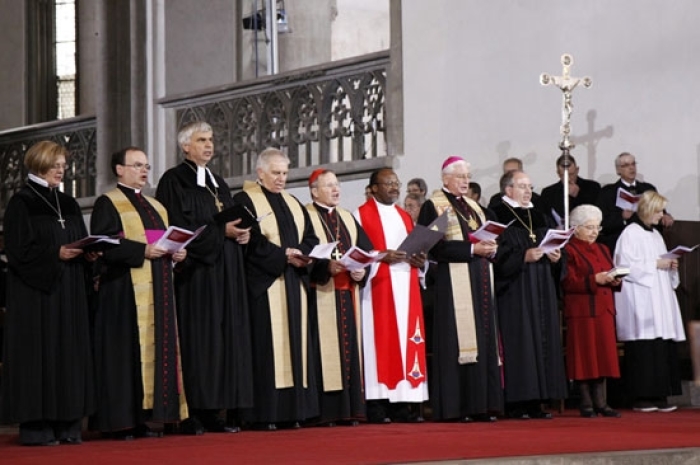Christian unity advancing despite ‘pockets of mutual rejection,’ Vatican official says

Unity among the many denominations within Christianity is making progress despite a few holdouts of “mutual rejection and contention” among some, according to a Vatican City official.
Irish Bishop Brian Farrell, secretary of the Pontifical Council for Promoting Christian Unity, had a column published last week by United Kingdom-based Catholic publication The Tablet regarding the state of Christian ecumenism.
Bishop Farrell argued that there were “undeniable signs of continuing progress in relations between the divided churches” despite some “signs of frustration and even retrenchment.”
“Pockets of mutual rejection and contention remain, but most of the world's Christians have come to recognise one another as brothers and sisters in Christ, united in a common baptism, and giving a common witness in serving the needs of suffering humanity,” wrote Farrell.
Farrell noted as examples that in recent times there have been several interdenominational dialogues on theology “as well as international meetings organised by the World Council of Churches and the Global Christian Forum and other ecumenical associations.”
“Rightly, the churches continue to commit important human and financial resources to theological dialogue, because every serious ecumenical advance involves overcoming remaining substantial doctrinal differences,” Farrell continued.
“This dialogue continues in the 14 bilateral theological dialogues with other Christian bodies in which the Pontifical Council for promoting Christian Unity is involved, and in numerous other regional or multilateral meetings, conferences and studies.”
One of the challenges to this ecumenical movement that appeared last year, according to Farrell, was the much-publicized decision by the Russian Orthodox Church to sever its ties to the global Orthodox Church community.
At issue was the Ecumenical Patriarchate of Constantinople’s decision to recognize the Ukrainian Orthodox Church as independent from Russian control, amid the political tensions between the two Eastern European countries.
“Whether and how the Dialogue Commission can effectively and usefully continue its work in the present situation is now an impelling question,” explained Farrell. “The challenge will be on the agenda of the meeting of the Coordinating Committee due to be held towards the end of the current year.”
Farrell’s column was published during the annual Week of Prayer for Christian Unity, held Jan. 18-25, between the feasts of St. Peter and St. Paul on the liturgical calendar.
The Week of Prayer featured worship materials, such as liturgy, developed in cooperation between the International Committee of the Faith and Order Commission of the World Council of Churches and the Pontifical Council for Promoting Christian Unity.
Fr. Tom Orians, SA, associate director of the Graymoor Ecumenical and Interreligious Institute, which helps to distribute Week of Prayer materials, told The Christian Post in an earlier interview that the theme for 2019 was "Justice, and only justice, you shall pursue,” taken from Deuteronomy 16:20.
“This year’s theme, which finds its origins in Deuteronomy, was chosen for its powerful message of promoting truth, equality and unity,” said Orians.
“It was prepared by a group of representatives from different parts of Indonesia, including the Communion of Churches in Indonesia and the Indonesian Catholic Bishops’ Conference who felt it spoke powerfully to their situation and needs, and recognized this common need throughout the world.”



























